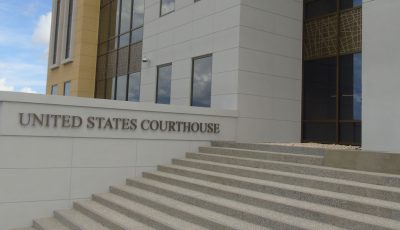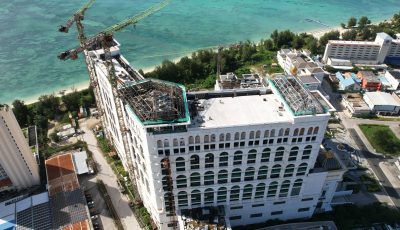Group criticizes new casino law
Marianas Economic Research and Development Foundation executive director Russell Schow believes the new casino law’s tax rate is the lowest of any casino operation in the world, is an invitation to organized crime, and has to be “killed.”
Speaking before the Rotary Club of Saipan on Tuesday at Hyatt Regency Saipan, Schow said the information he used to deduce his conclusion were all based on contacts from gaming commissions and boards in Nevada, a regulatory authority and a minister of finance in Singapore, and an attorney in the United States.
According to Schow, the new casino law that had been rushed and is “effectively the lowest by far of any tax rate of any casino operation in the world and any industrialized and developed nation.”
“There is no place that compares to this,” Schow said.
According to him, Macau gets 40 percent of gross revenues, while the U.S. is a little bit under 30 percent of gross revenues.
“But here [on Saipan] it’s going to be 17-and-a-half percent of the profit,” Schow said. “That’s unheard of. That makes this quite literally the biggest invitation to organized crime. This is the cheapest place now to launder money. The FBI is going to be very concerned about this.”
According to Schow one of the things the FBI has been finding out in Macau is that some of the money being laundered goes to terrorist groups.
“I think this is a very bad deal for the community,” Schow said. “The CNMI has to start increasing the police force or there would be more crime.”
Schow also noted that Singapore includes in its requests for proposal the building of an infrastructure. Manila in the Philippines, he said, put out a full request for concepts in integrated resort operations but they soon realized the airport was not “really big enough and the road system would not be able to handle [the added traffic].”
“None of that is being included in this [casino law],” Schow said.
He said the group he represents wants to try and kill the bill.
“We do have some concerns about these people coming in and dropping in their $1 million and $30 million and then having to pay it back. We have to find some way to actually kill this,” Schow said.
He said the casino investor will pay the $30 million in one year, but wouldn’t the following year.
“The CNMI will then need to start building the infrastructure. If they build this operation, the waste pipes and sewage, they’re all too small and they will need to be replaced. Who’s going to do that? Is that supposed to be from CNMI taxpayers? Who’s going to build the road systems? How are they going to upgrade the airport? Who’s paying for that? Because ‘this’ investor is not agreeing to it,” Schow said.
According to him, one of the promised benefits of the casino law is to help out with the Retirement Fund but “they will this year and it will be just be before the election.”
“That’s a political ploy, and that type of ploy doesn’t just happen here, it happens everywhere,” Schow said.
“All the issues have to be addressed, that’s the problem we have with this bill, and none of them are being addressed except for promises. No place would allow this on a ‘promise’ unless you can trust the businesses that come out,” he added.



























